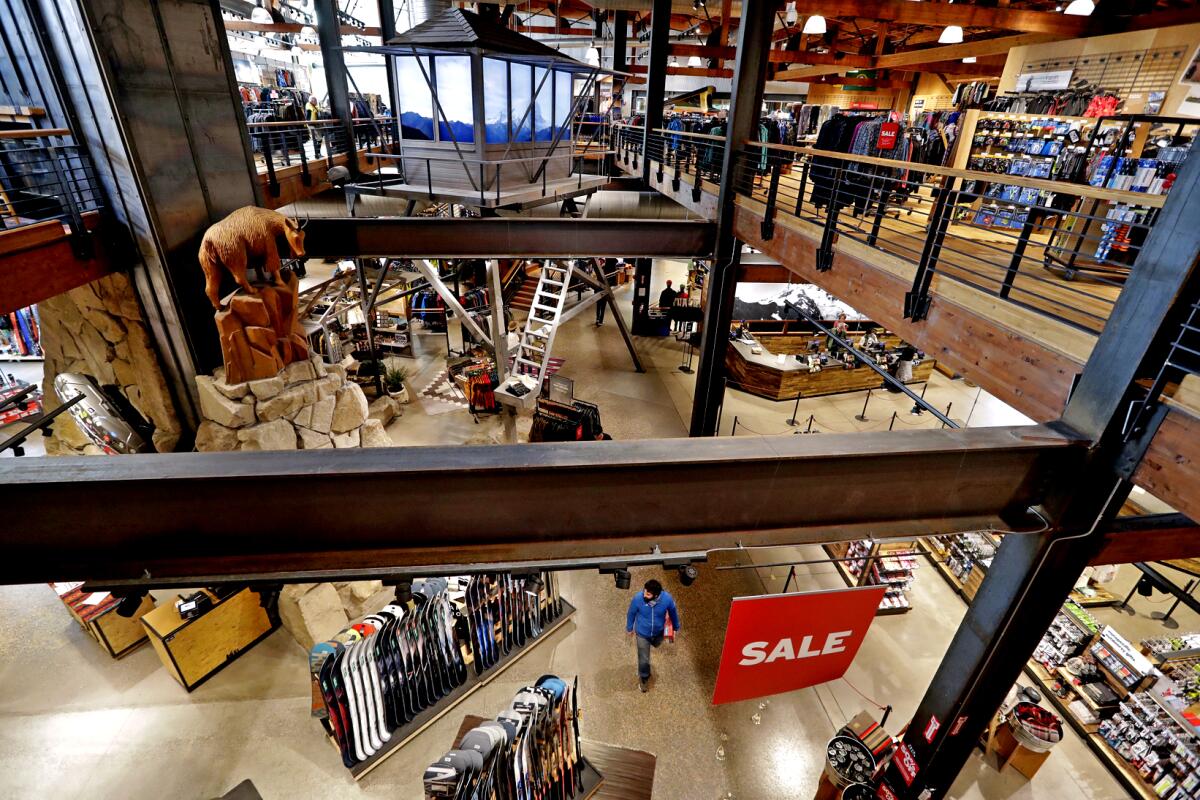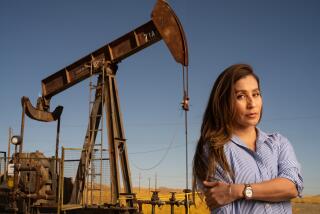How did REI spend Earth Month? Glorifying a gas-guzzling SUV
Outdoor retailer REI calls climate change “the largest existential threat facing our members’ enjoyment of life outdoors and the survival of REI Co-op.” The company has pledged to cut its planet-warming emissions in half over the next decade, roughly in line with the commitment made by President Biden at an Earth Day summit Thursday.
But that isn’t stopping REI from using its eco-friendly image to help Ford promote gas-guzzling SUVs.
In a series of ads and videos sponsored by the carmaker, the latest of which was released this week, REI chronicles the journey of four cyclists traversing a 220-mile route through Arizona known as the Sky Islands Odyssey. The videos feature plenty of glamour shots and praise of Ford’s Bronco Sport as it accompanies the bikers through off-road desert terrain, loaded with gear.
“The Ford Bronco Sport is a really good option for this — it has high clearance, it has four-wheel drive,” Len Necefer, one of the featured cyclists, says in a video titled, “Making the Bronco Sport Our Ultimate Outdoor Rig.” Leaning against the trunk of the compact SUV, Necefer explains how the vehicle enables the bikers to have “a little bit more cush ride of an experience.”
Cars and trucks are America’s biggest source of climate pollution, with transportation responsible for nearly 30% of the nation’s carbon emissions. That’s why Biden wants to install half a million electric vehicle charging stations, and why Gov. Gavin Newsom has ordered an end to the sale of gasoline-fueled vehicles in California no later than 2035.
It’s also why an ad campaign such as REI’s is so dangerous, said Jamie Henn, founder of the advocacy group Fossil Free Media.
“With 20 million co-op members and millions of customers who come into their stores, REI is one of the nation’s most influential voices on conservation and environmental issues,” Henn said. “And here they are in 2021 promoting an internal combustion engine vehicle that gets terrible miles per gallon.”
“Creativity has consequences,” he added. “When REI does a partnership like this, it reads as an endorsement for these vehicles, and it equates being out in nature with having a big muscle-car SUV that’s burning gas.”
Our oceans. Our public lands. Our future.
Get Boiling Point, our new newsletter exploring climate change and the environment, and become part of the conversation — and the solution.
You may occasionally receive promotional content from the Los Angeles Times.
REI spokesperson Megan Behrbaum said in an email that the company partnered with Ford “to create content where people could see themselves having an active lifestyle in the outdoors.” The ads feature several Native American cyclists, including Necefer, a member of the Navajo Nation and founder of the outdoor gear company NativesOutdoors.
But Behrbaum acknowledged that the subject line of an REI email this month introducing the Ford campaign to members — “Load Up. Gas Up. Get Out.” — was “misaligned” with the company’s mission.
REI’s director of sustainability, Matt Thurston, went further, telling a frustrated co-op member via email that he was “not aware of the advertisement before its release,” according to a copy of the email shared with The Times.
“I’ve since had a conversation with the team leading that body of work to convey your (and my) concerns about the message,” Thurston told the member. “They understand the opportunity to align our messaging with our environmental ethos.”
A cheeky hidden message is the company’s latest call to action on climate change and protecting public lands.
Global warming poses a grave threat to many of the natural landscapes loved by campers, hunters and other outdoor recreation enthusiasts. Rising temperatures, reduced snowpack and more destructive wildfires are only a few of the dangers.
In Joshua Tree National Park, the namesake species is slowly dying out. At the Grand Canyon, bald eagles could go extinct.
REI has made environmental stewardship a core part of its branding, describing itself as “a different kind of company” willing to “put purpose before profits and act in the long-term interests of our members and community.” The firm offers a detailed look at its carbon footprint and explains how it’s reducing energy use and investing in renewable power sources such as solar.
“The climate crisis is human-driven and the direct result of the actions we take every day,” REI says on its website. “As a member-owned co‑op, we have a responsibility to preserve the long-term health of the planet and our community.”
Like several outdoor retailers, including Patagonia and the North Face, REI got increasingly political as the Trump administration dismantled environmental rules. The company slammed Trump’s decision to roll back safeguards for Utah’s Bears Ears and Grand Staircase-Escalante national monuments, and endorsed the “30 by 30” campaign to protect 30% of U.S. lands and waters by 2030.
Those positions stood to help the company’s bottom line. A survey commissioned by the Center for Western Priorities, a conservation advocacy group, found strong bipartisan support for keeping public lands pristine, with 64% of voters viewing outdoor retailers such as REI and Patagonia favorably, compared with scores in the mid-30% range for oil and coal companies.
The ideological diversity among people who love the outdoors — including urban liberals shopping for a hiking pack and rural conservatives stocking up on fishing gear — also means those retailers can move public opinion like few other businesses can.
“They have a big ax to swing, or a big weight to throw around, when it comes to swaying the decisions of their voters, because so many people’s personal identities are tied to the activities they participate in, more than their identities are aligned to any political party,” Jordan Smith, director of Utah State University’s Institute of Outdoor Recreation and Tourism, told The Times last year.
Major auto companies, meanwhile, have turned to trusted brands to help market their growing selection of electric cars.
Chevrolet, for instance, partnered with Disney earlier this year on a commercial promoting the Bolt EUV, basically an electric SUV. The 90-second spot featured characters and motifs from “Star Wars,” “Peter Pan” and other iconic films. Chevy parent company General Motors ran a Super Bowl ad for its electric vehicle lineup that starred Will Ferrell, Kenan Thompson and Awkwafina.
The world’s most influential storytelling machine is lending some of its most iconic brands to the clean energy transition.
Unlike GM, which says it will stop selling passenger vehicles that run on gasoline by 2035, Ford hasn’t committed to phasing out combustion engines. But it’s aiming for carbon neutrality by 2050 and says it will invest $22 billion in electric cars through 2025.
The automaker also sided with California in its fight with the Trump administration over fuel-efficiency rules. And it’s currently selling or developing electric versions of all its most well-known vehicles, including the F-150 pickup truck.
As for the four-wheel-drive Bronco Sport, it gets either 23 or 26 mpg depending on the engine.
Henn, though, thinks companies that want to do good in the world need to do more than reduce their carbon footprint. They also need to consider their cultural footprint.
His advocacy group has a Clean Creatives campaign that’s pressing public relations and advertising executives to stop working with the coal, oil and gas companies whose products fuel the climate crisis. It’s also asking climate-conscious businesses to commit to stop hiring ad agencies that have fossil fuel industry clients.
REI turned it down on that request, Henn said.
“That broke my heart. I had my wedding registry at REI,” he said.

Before teaming up with Ford, REI took into consideration “how our respective companies have shared values around topics like climate change and racial equity,” Behrbaum said. She pointed to Ford’s Bronco Wild Fund, which donates some of the revenue from Bronco sales to nonprofits focused on protecting public lands and making the outdoors more accessible to all.
“As we establish Bronco as a credible, outdoor lifestyle brand, we want to partner with other like-minded brands who share similar values/mission,” Ford spokesperson Debra Hotaling said in an email. “As an automotive manufacturer, we challenge ourselves to make the world a better place every day.”
Support our journalism
Your support helps us deliver the news that matters most. Subscribe to the Los Angeles Times.
For REI, it will ultimately be the co-op’s member-owners whose judgment matters most.
For Bruce Grossan, whose frustrated email about the Ford partnership prompted the conciliatory reply from REI’s director of sustainability, the only reasonable solution is for the outdoor retailer to end the ad campaign and publicly apologize.
“REI is supposed to be our buddy,” Grossan said. “I feel bad about going after a company that has a sustainability policy. And yet if they’re not walking the walk, then why not?”
More to Read
Your guide to our clean energy future
Get our Boiling Point newsletter for the latest on the power sector, water wars and more — and what they mean for California.
You may occasionally receive promotional content from the Los Angeles Times.











